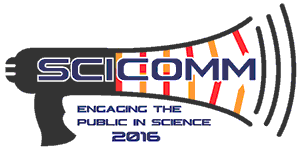
SciComm 2016 - Lincoln, Nebraska, September 23-24, 2016
Date of this Version
9-24-2016
Document Type
Presentation
Citation
Presented at SciComm 2016, Lincoln, Nebraska, September 24, 2016.
Abstract
Myths: •People just need to know the facts •People just need to be aware of the issues & consequences •People just need to see the $$ •Attitudes lead to behavior
Does knowledge lead to behavior?
•Knowledge correlates with behavior True
•Education increases knowledge True
•Increasing knowledge leads to behavior change False
What motivates behavior?
•Awareness campaigns can produce the opposite of goal –they use norms describing undesired behavior •boomerang effects –can cause the opposite effect as some conform with perceived social norms
The problem is WE are the evaluator of potential success based on what works for us. But we are not our audience. We cannot assume. Not about knowledge. Not about values. We must ask the audience and we must appeal to their needs.
What makes an effective message? What are the Do’s?
Behavior Change Strategies •Appeal to identity •Likeable source •Reciprocity, Scarcity •Be careful of incentives •Commitment •Prompts •Modeling –social proof, norms •Feedback •Involving narrative
Using norms to create change
Creating a Culture of Change •Individual Role Models •Emotional ties •Culture •Norms •Empowerment •Collective identity
Some Current Projects •Campus Recycling and Composting •Backpacks for Adventures •Replacing Trees –decisions and emotions
Included in
Life Sciences Commons, Medicine and Health Sciences Commons, Other Communication Commons, Science and Technology Studies Commons


Comments
Copyright © 2016 Lisa Pennisi